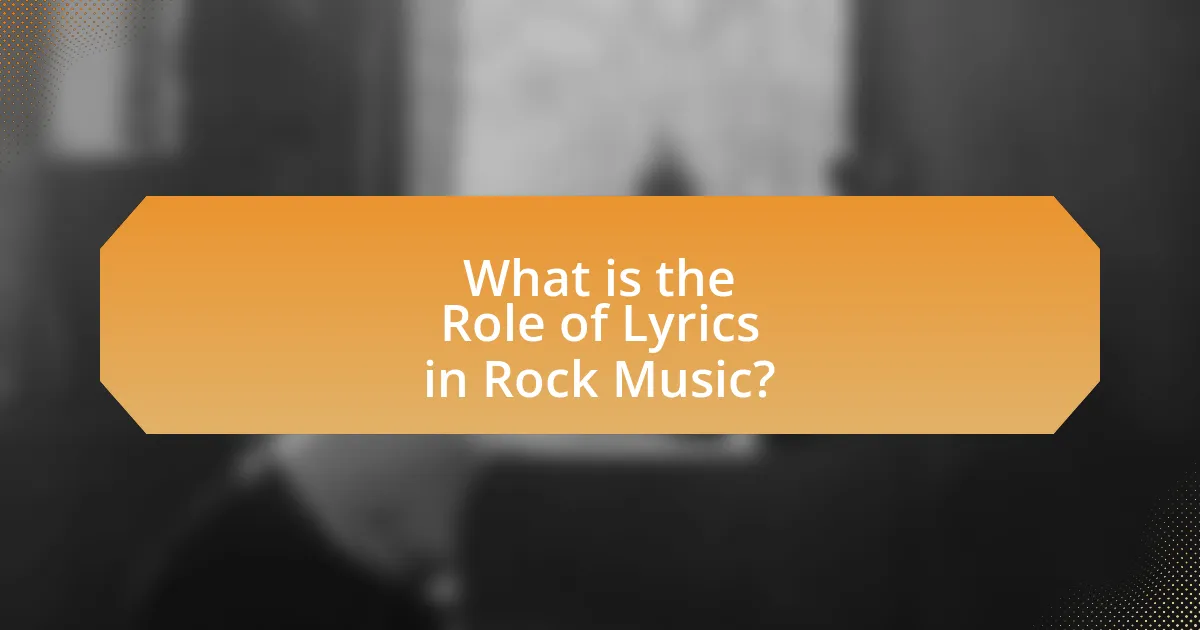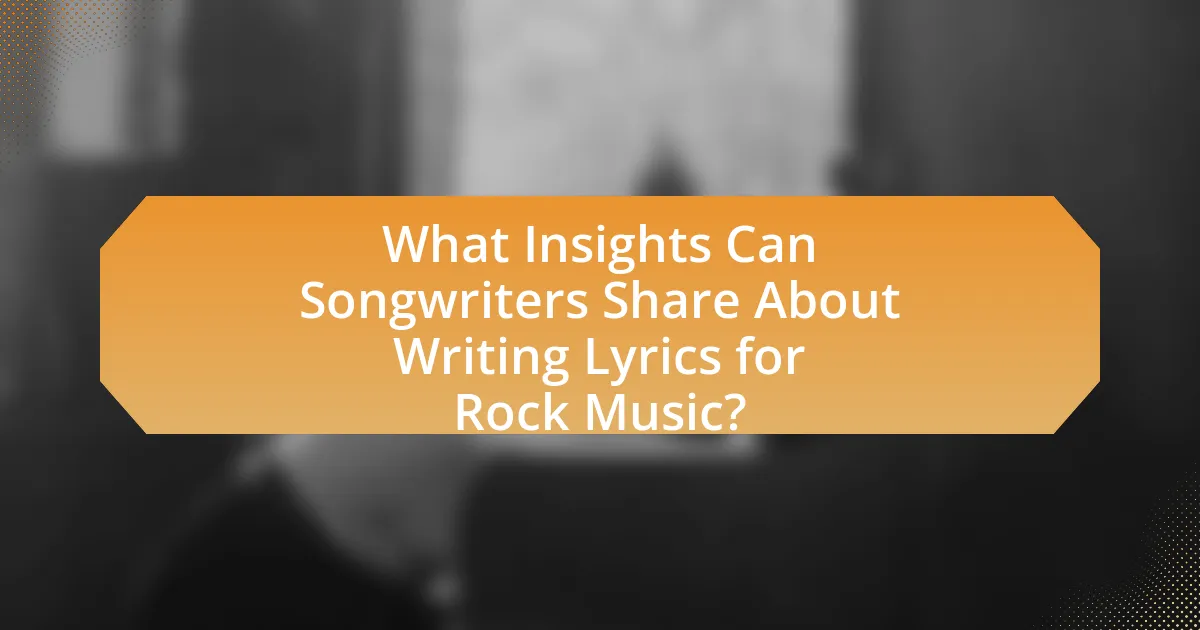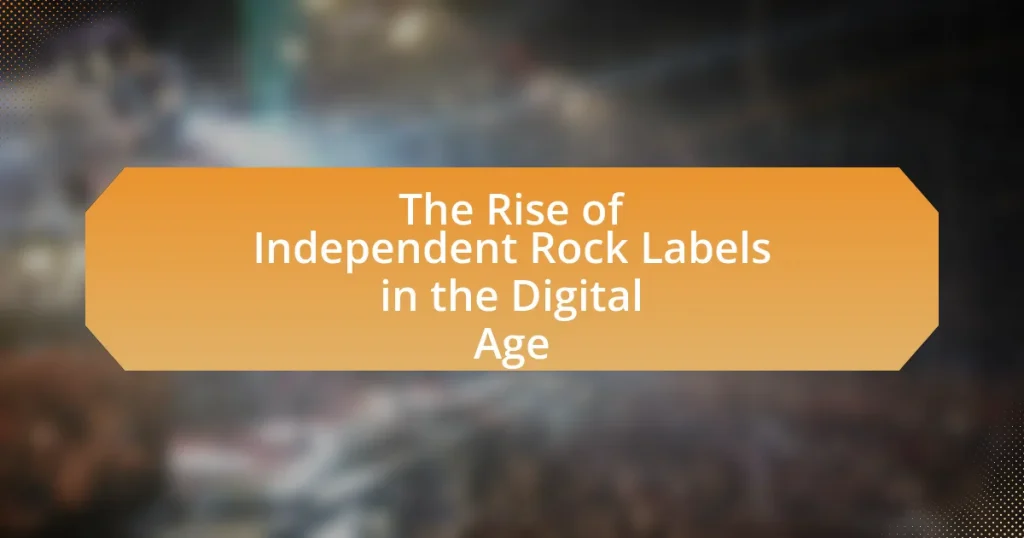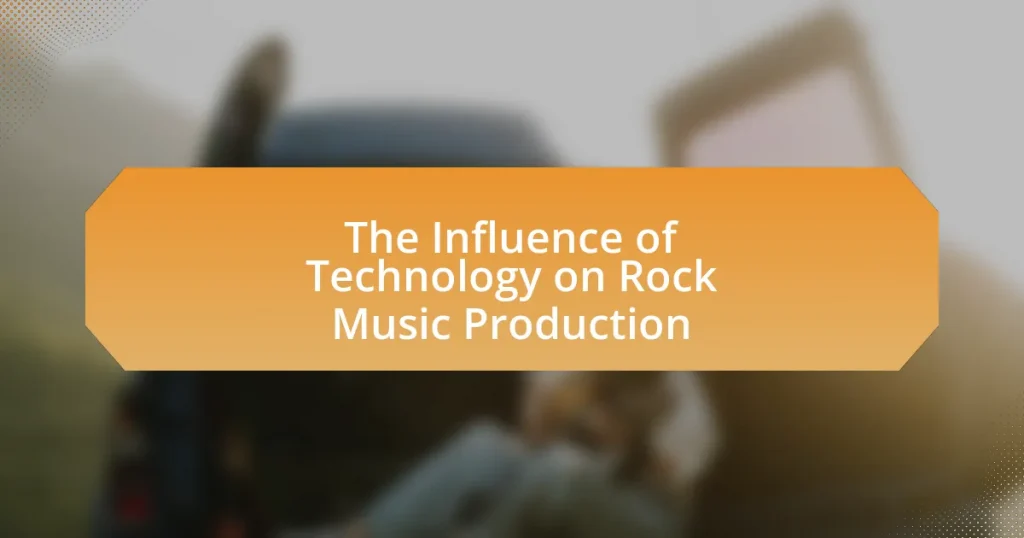The article examines the critical role of lyrics in rock music, highlighting their function as a medium for storytelling, emotional expression, and social commentary. It explores how lyrics influence the overall message of a song, the common themes they address, and the impact of personal experiences on songwriting. Additionally, the article discusses the ways in which lyrics reflect cultural and social issues, the techniques songwriters use to enhance lyrical impact, and the challenges they face in the creative process. Insights from songwriters on best practices and resources for refining lyric writing are also provided, emphasizing the importance of authenticity and emotional resonance in creating impactful rock music.

What is the Role of Lyrics in Rock Music?
Lyrics in rock music serve as a powerful medium for storytelling, emotional expression, and social commentary. They convey themes that resonate with listeners, often reflecting personal experiences, societal issues, or cultural movements. For instance, songs like “Fortunate Son” by Creedence Clearwater Revival critique social inequality and the Vietnam War, illustrating how lyrics can provoke thought and inspire change. Additionally, the lyrical content often enhances the musical composition, creating a deeper connection between the artist and the audience, as seen in the emotionally charged lyrics of “Hurt” by Nine Inch Nails, which explore themes of pain and regret. Thus, lyrics in rock music are essential for conveying messages and evoking emotional responses.
How do lyrics influence the overall message of a rock song?
Lyrics significantly influence the overall message of a rock song by conveying themes, emotions, and narratives that resonate with listeners. The specific choice of words, imagery, and storytelling techniques in the lyrics can evoke strong feelings and create a connection between the artist and the audience. For instance, songs like “Imagine” by John Lennon use simple yet powerful lyrics to promote peace and unity, effectively delivering a profound message. Additionally, the lyrical content often reflects social and political issues, as seen in songs like “Killing in the Name” by Rage Against the Machine, which critiques systemic racism and injustice. Thus, the lyrics serve as a crucial vehicle for expressing the song’s core message and engaging listeners on multiple levels.
What themes are commonly explored in rock lyrics?
Common themes explored in rock lyrics include rebellion, love, social issues, and personal struggle. Rebellion often reflects a desire to challenge authority or societal norms, as seen in songs like “Fight the Power” by Public Enemy. Love is frequently depicted in various forms, from romantic to unrequited, illustrated by classics like “I Want to Know What Love Is” by Foreigner. Social issues such as war, poverty, and inequality are also prevalent, with tracks like “Fortunate Son” by Creedence Clearwater Revival addressing these topics directly. Personal struggle, including themes of addiction and mental health, is poignantly captured in songs like “Hurt” by Nine Inch Nails. These themes resonate with listeners, making rock lyrics a powerful medium for expression and connection.
How do personal experiences shape the lyrics of rock songs?
Personal experiences significantly shape the lyrics of rock songs by providing authentic emotional content and relatable narratives. Rock songwriters often draw from their own life events, such as relationships, struggles, and triumphs, to create lyrics that resonate with listeners. For instance, Bruce Springsteen’s “Born to Run” reflects his desire to escape and find freedom, rooted in his experiences growing up in New Jersey. This connection between personal narrative and lyrical content enhances the emotional impact of the songs, making them more relatable and powerful for audiences.
Why are lyrics considered essential to the identity of rock music?
Lyrics are considered essential to the identity of rock music because they convey the genre’s themes of rebellion, personal struggle, and social commentary. Rock music often reflects the cultural and political landscape, with lyrics that resonate with listeners’ experiences and emotions. For instance, songs like “Fortunate Son” by Creedence Clearwater Revival critique social inequality and the Vietnam War, encapsulating the spirit of the era. This lyrical depth not only enhances the music’s emotional impact but also establishes a connection between the artist and the audience, solidifying rock music’s role as a voice for change and expression.
In what ways do lyrics differentiate rock music from other genres?
Lyrics in rock music often differentiate the genre through their themes of rebellion, personal struggle, and social commentary. Rock lyrics frequently explore topics such as disillusionment, love, and existential angst, which resonate with the genre’s roots in counterculture movements. For instance, songs like “Born to Run” by Bruce Springsteen encapsulate a yearning for freedom and escape, reflecting the socio-political climate of the 1970s. This focus on raw emotion and storytelling sets rock apart from genres like pop, which may prioritize catchy hooks and lighter themes. Additionally, rock lyrics often employ metaphor and vivid imagery, enhancing their emotional impact and depth, as seen in works by artists like Bob Dylan, whose complex narratives challenge listeners to engage critically with the content.
How do lyrics contribute to the emotional connection with listeners?
Lyrics contribute to the emotional connection with listeners by conveying relatable themes and personal experiences that resonate deeply. When songwriters articulate feelings of love, loss, or struggle, they create a narrative that listeners can identify with, fostering empathy and emotional engagement. Research indicates that lyrics that evoke strong imagery and storytelling enhance emotional responses; for instance, a study published in the Journal of Experimental Psychology found that songs with vivid lyrics elicit stronger emotional reactions compared to those with abstract content. This connection is further strengthened when listeners perceive authenticity in the lyrics, as genuine expressions of emotion can lead to a sense of shared experience, making the music more impactful.
What role do lyrics play in the songwriting process?
Lyrics serve as the narrative and emotional core of a song in the songwriting process. They convey the message, themes, and feelings that the songwriter intends to express, often shaping the overall structure and melody of the music. For instance, in rock music, lyrics can reflect personal experiences, social issues, or storytelling elements that resonate with listeners, enhancing their connection to the song. This significance is supported by the fact that many successful rock songs, such as “Bohemian Rhapsody” by Queen, are renowned for their impactful lyrics, which contribute to their lasting popularity and cultural relevance.
How do songwriters approach lyric writing in rock music?
Songwriters approach lyric writing in rock music by focusing on personal experiences, emotions, and storytelling. They often draw inspiration from their own lives or societal issues, aiming to create relatable and impactful narratives. For instance, many iconic rock songs, such as “Born to Run” by Bruce Springsteen, reflect themes of escape and longing, resonating deeply with listeners. This method allows songwriters to connect with their audience on an emotional level, making the lyrics memorable and significant. Additionally, rock songwriters frequently utilize vivid imagery and metaphor to enhance their messages, further engaging listeners and enriching the overall musical experience.
What techniques do songwriters use to enhance lyrical impact?
Songwriters enhance lyrical impact through techniques such as imagery, metaphor, and repetition. Imagery allows listeners to visualize emotions and scenes, making the lyrics more relatable and vivid. For example, Bob Dylan often used rich imagery to evoke strong feelings in his songs, which contributed to their lasting impact. Metaphors create deeper meanings and connections, allowing listeners to interpret the lyrics on multiple levels; for instance, Leonard Cohen’s use of metaphor in “Hallelujah” adds layers of complexity to the song’s themes. Repetition reinforces key ideas and emotions, making them more memorable; this technique is evident in many pop songs, where catchy choruses are repeated to emphasize the central message. These techniques collectively contribute to the emotional resonance and memorability of a song’s lyrics.

How do Lyrics Reflect Cultural and Social Issues in Rock Music?
Lyrics in rock music often serve as a mirror to cultural and social issues, addressing themes such as political unrest, identity, and societal norms. For instance, songs like “Fortunate Son” by Creedence Clearwater Revival critique the Vietnam War and class disparity, highlighting the frustrations of those who felt marginalized. Additionally, tracks like “Fight the Power” by Public Enemy confront racial inequality, showcasing how rock music can amplify voices of dissent and advocate for change. This connection between lyrics and social commentary is evident in the genre’s history, where artists have consistently used their platforms to reflect and challenge the prevailing cultural landscape.
What historical events have influenced rock lyrics?
Historical events such as the Vietnam War, the Civil Rights Movement, and the counterculture of the 1960s have significantly influenced rock lyrics. The Vietnam War inspired songs like “Fortunate Son” by Creedence Clearwater Revival, which criticized social inequality and the draft. The Civil Rights Movement led to powerful anthems like “A Change Is Gonna Come” by Sam Cooke, reflecting the struggle for racial equality. Additionally, the counterculture of the 1960s, characterized by anti-establishment sentiments, shaped lyrics in songs like “Revolution” by The Beatles, advocating for social change. These events provided a backdrop for artists to express their views and emotions, making rock music a vehicle for political and social commentary.
How do rock lyrics address political and social movements?
Rock lyrics address political and social movements by serving as a platform for commentary and activism. Artists like Bob Dylan and Rage Against the Machine have used their lyrics to critique government policies, social injustices, and war, effectively mobilizing listeners around these issues. For example, Bob Dylan’s “The Times They Are a-Changin'” became an anthem for the civil rights movement, reflecting the societal shifts of the 1960s. Similarly, Rage Against the Machine’s “Killing in the Name” critiques systemic racism and police brutality, resonating with movements like Black Lives Matter. These examples illustrate how rock lyrics not only reflect societal issues but also inspire action and awareness among audiences.
What role do lyrics play in shaping cultural identity within rock music?
Lyrics play a crucial role in shaping cultural identity within rock music by reflecting societal issues, personal experiences, and collective emotions. Rock music often addresses themes such as rebellion, love, and social justice, which resonate with listeners and foster a sense of belonging. For example, songs like “Fight the Power” by Public Enemy and “Born to Run” by Bruce Springsteen encapsulate the struggles and aspirations of their respective communities, thereby influencing cultural narratives. This connection between lyrics and cultural identity is supported by studies indicating that music can serve as a vehicle for social change and identity formation, as seen in the works of authors like Simon Frith, who emphasizes the relationship between music and social context.
How do contemporary issues find their way into rock lyrics?
Contemporary issues find their way into rock lyrics through the artists’ reflections on societal events, personal experiences, and cultural movements. Rock musicians often draw inspiration from current events such as political unrest, social justice movements, and environmental concerns, translating these themes into their lyrics to resonate with listeners. For instance, songs like “Killing in the Name” by Rage Against the Machine address systemic racism and police brutality, directly responding to the socio-political climate of their time. This integration of contemporary issues not only enhances the emotional depth of the music but also fosters a connection between the artist and the audience, making the lyrics relevant and impactful.
What are some examples of recent rock songs that tackle current events?
Recent rock songs that tackle current events include “The Last Great American Dynasty” by Taylor Swift, which addresses social issues and historical narratives, and “The End of the World” by Billie Eilish, which reflects on climate change and societal anxieties. Additionally, “American Reckoning” by The Killers responds to the Black Lives Matter movement, highlighting racial injustice. These songs exemplify how contemporary rock artists engage with pressing societal issues through their lyrics.
How do songwriters balance personal expression with social commentary?
Songwriters balance personal expression with social commentary by intertwining their individual experiences with broader societal issues. This approach allows them to create relatable narratives that resonate with listeners while addressing significant themes. For instance, Bruce Springsteen often draws from his own life in New Jersey to comment on economic struggles, effectively merging personal storytelling with social critique. This technique not only enhances the emotional depth of the lyrics but also engages audiences in meaningful conversations about relevant social topics.

What Insights Can Songwriters Share About Writing Lyrics for Rock Music?
Songwriters can share that writing lyrics for rock music often involves personal storytelling, emotional authenticity, and a strong connection to the music’s energy. Rock lyrics frequently reflect themes of rebellion, love, and social issues, which resonate with listeners. For instance, Bruce Springsteen’s lyrics in “Born to Run” encapsulate a yearning for freedom and escape, illustrating how personal experiences can drive powerful songwriting. Additionally, the use of vivid imagery and metaphors enhances the emotional impact, as seen in Led Zeppelin’s “Stairway to Heaven,” where abstract concepts are made relatable. This approach not only engages the audience but also creates a lasting connection between the song and its listeners.
What common challenges do songwriters face when writing rock lyrics?
Songwriters face several common challenges when writing rock lyrics, including the need for originality, emotional authenticity, and fitting within musical structure. Originality is crucial as rock music often draws from a rich history, making it difficult to create fresh content that resonates with audiences. Emotional authenticity is essential because rock lyrics typically convey deep feelings, and failing to connect on this level can result in lyrics that feel insincere or forced. Additionally, songwriters must ensure that their lyrics align with the rhythm and melody of the music, which can limit creative expression. These challenges are supported by the competitive nature of the music industry, where unique and relatable lyrics are often key to a song’s success.
How can songwriters overcome writer’s block in lyric writing?
Songwriters can overcome writer’s block in lyric writing by employing techniques such as free writing, setting specific time limits for creativity, and seeking inspiration from various sources like literature, art, or personal experiences. Free writing allows songwriters to express thoughts without self-censorship, often leading to unexpected ideas. Research indicates that time constraints can enhance creativity by forcing quick decision-making, which can lead to more authentic lyric creation. Additionally, drawing inspiration from diverse experiences can provide fresh perspectives and themes, enriching the songwriting process.
What strategies can enhance creativity in lyric composition?
To enhance creativity in lyric composition, songwriters can employ strategies such as free writing, collaboration, and drawing inspiration from diverse sources. Free writing encourages the flow of ideas without self-censorship, allowing for unexpected themes and phrases to emerge. Collaboration with other musicians or lyricists can introduce new perspectives and techniques, fostering innovative ideas. Additionally, exploring various art forms, literature, and personal experiences can provide rich material for lyrics, as evidenced by many successful songwriters who cite diverse influences in their work. These strategies collectively contribute to a more dynamic and creative lyric-writing process.
What best practices should aspiring songwriters follow?
Aspiring songwriters should prioritize consistent practice, collaboration, and studying successful songs. Regularly writing lyrics enhances creativity and skill, as evidenced by many successful songwriters who dedicate time daily to their craft. Collaborating with other musicians can provide fresh perspectives and ideas, which is supported by the fact that many hit songs are co-written. Additionally, analyzing the structure and themes of popular songs helps aspiring songwriters understand what resonates with audiences, as demonstrated by the success of artists who draw inspiration from existing works while adding their unique voice.
How can collaboration with other musicians improve lyric writing?
Collaboration with other musicians can significantly enhance lyric writing by introducing diverse perspectives and creative ideas. When songwriters work together, they can share unique experiences and emotional insights, which can lead to more relatable and impactful lyrics. For instance, a study published in the Journal of Music Theory found that collaborative songwriting often results in richer thematic content and varied lyrical structures, as different artists contribute their individual styles and influences. This synergy not only fosters innovation but also helps in overcoming writer’s block, as partners can inspire each other and provide constructive feedback, ultimately leading to a more polished and compelling final product.
What resources are available for songwriters to refine their craft?
Songwriters can refine their craft through various resources, including songwriting workshops, online courses, and songwriting books. Workshops, such as those offered by organizations like the Songwriters Guild of America, provide hands-on experience and feedback from industry professionals. Online platforms like Coursera and MasterClass offer courses taught by successful songwriters, covering techniques and industry insights. Additionally, books such as “Writing Better Lyrics” by Pat Pattison provide structured guidance and exercises to enhance lyrical skills. These resources collectively support songwriters in developing their abilities and understanding the nuances of lyric writing in rock music.
What tips can help songwriters create impactful lyrics in rock music?
To create impactful lyrics in rock music, songwriters should focus on authenticity, vivid imagery, and emotional resonance. Authenticity ensures that the lyrics reflect genuine experiences or feelings, which can connect deeply with listeners. Vivid imagery helps paint a picture in the audience’s mind, making the song more memorable and engaging. Emotional resonance allows listeners to relate to the themes and emotions expressed, enhancing the overall impact of the song. For instance, many successful rock songs, such as “Smells Like Teen Spirit” by Nirvana, utilize these elements to evoke strong feelings and create lasting impressions.



